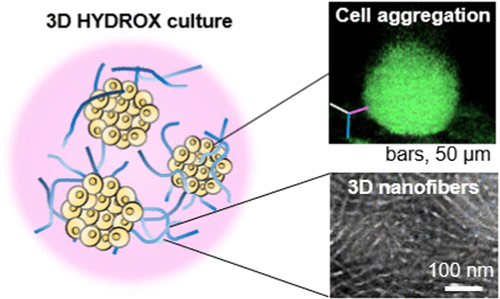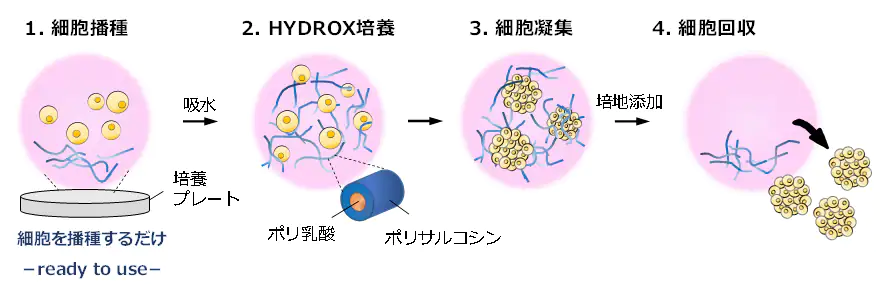

SHIMADZU:細胞の三次元培養を実現:簡単・安全に(動画):
SHIMADZU: Achieves three-dimensional culture of cells: Easy and safe:
岛津:实现细胞三维培养:简单安全
ー三次元ナノファイバー「HYDROX」を社外提供ー
大阪大学大学院薬学研究科
島津製作所共同研究でヒトiPS細胞から肝細胞への分化誘導に適用しました。
細胞の三次元培養を実現します。
三次元ナノファイバーHYDROXを、2022年1月から研究機関、企業に提供します(図1)
細胞の三次元培養を実現:
当社は、
細胞研究に携わる研究機関を支援するため、
細胞培養ソリューション研究開発において、オープンイノベーションを推進してきました。
細胞塊のサンプル提供:
細胞研究や創薬、再生医療などでは、
生体の機能に近い細胞塊を、生体外で構築することが求められます。
三次元ナノファイバー「HYDROX」:
細胞塊の形成を補助する当社独自開発の新素材です。
大阪大学分子生物学分野
水口裕之教授、
鳥羽由希子特任助教今年8月研究グループと共同で、
「HYDROXをiPS細胞から肝細胞への分化誘導」に成功しました。
高効率に肝細胞へ分化することを解明しました(参考文献1)
分子生物学会で発表:
「HYDROX」について、
12月1日開催の分子生物学会で発表、
12月8日開催の再生医療EXPO(幕張メッセ)で展示を予定しております。
2021年 | ニュース | 島津製作所
https://www.shimadzu.co.jp/news/press/rwzo59_ut8znh8pf.html
Development of a 3D Cell Culture System Using Amphiphilic Polydepsipeptides and Its Application to Hepatic Differentiation
Abstract
Various three-dimensional (3D) culture systems
are available to provide more accurate in vivo mimicry than two-dimensional (2D) cultures.
Synthetic and/or xeno-free biomaterials are desired, as they would provide lower batch-to-batch variability and high repeatability.
Here,
we introduce a 3D culture system
using nanofibers composed of an amphiphilic polydepsipeptide-based polymer named HYDROX, which turns into 3D nanofibers after hydration.Our system produces a large amount of cell aggregates and requires only the seeding of a cell mixture.
In addition,
cells cultured with HYDROX
can be collected with only a centrifugation procedure, and analytical assays can then be performed.Here,
we applied HYDROX to hepatic differentiation from induced pluripotent stem cells.The cells cultured with HYDROX formed
aggregates and HYDROX strongly promoted hepatic differentiation and maturation in terms of functions
such as the positive ratio of
alpha-1 antitrypsin,
the production of albumin,
the cytochrome P450 (CYP) 3A4 activity, and the low-density-lipoprotein uptake ability.In addition,
primary human hepatocytes cultured with HYDROXshowed significantly improved CYP3A4 gene expression and activity.
The viscoelasticity and stiffness of HYDROX
can be modulated by varying the concentration of the synthetic polymer, thereby providing a suitable microenvironment for the differentiation of cells with various characteristics toward a target cell type.
Our findings demonstrated that
HYDROX is a promising biomaterial for 3D cultures in research fields ranging from basic cell research to drug discovery.ACS Applied Bio Materials